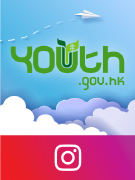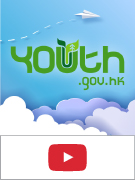#UniformGroups
Search Result: 1
The Government strives to nurture youths and support them in fully realising their potential. Youth uniformed groups offer important platforms for promoting youth development. To this end, most of the disciplined and auxiliary services departments have set up their own youth uniformed groups to nurture young people’s sense of social responsibility, enhance their law-abiding awareness and help them develop leadership skills through a series of classroom and physical training. Information about the youth uniformed groups under the disciplined and auxiliary services departments is listed below for easy reference. Junior Police Call The Hong Kong Police Force has all along been actively promoting youth development. With the mission of nurturing fight crime partners and future leaders, it founded its flagship youth organisation, the Junior Police Call (JPC), in 1974. Currently, Advanced Leaders and members of JPC Leader Corps who join foot drill training are uniformed to reinforce the sense of belonging. On top of organising regular leadership camps to build up young people’s resilience, team spirit and leadership skills, JPC has also launched new programmes, e.g. innovation and technology competitions, in recent years to enhance its appeal to young people. In April 2021, JPC introduced the Junior Police Call Mobile Application (JPC App) to facilitate the recruitment of new members and the participation of existing members. In addition, JPC implemented a new youth engagement strategy under the acronym “IDEAS” this year to highlight the elements of JPC’s activities, namely “Innovation”, “Discipline”, “Exposure”, “Adventure” and “Synergy”. With this new strategy, JPC has also launched a new awards scheme, with a view to enriching members’ learning experience systematically. Looking ahead, JPC will also offer youth exchange opportunities in the Greater Bay Area to let participants gain first-hand experience of the opportunities in the Greater Bay Area. >> Website of Junior Police Call (The video is in Chinese) Fire and Ambulance Services Teen Connect The Fire Services Department (FSD) established its youth uniformed group, called the Fire and Ambulance Services Teen Connect (FAST Connect), in 2021. FAST Connect aims to provide a learning platform for its members, arranging regular training and activities to equip them with a rich learning experience. Apart from providing practical training on basic fire-fighting and rescue techniques, basic first-aid skills and fire safety knowledge, FAST Connect also covers national education (e.g. the Chinese-style foot drill) to enhance the sense of belonging to the country among youth. Exchange sessions with community leaders and Hong Kong elite athletes are also arranged for members. Through participating in the various training and activities arranged by FSD, young people can acquire new knowledge outside the classroom, learn more about the country’s development and build a good character, with a view to building a solid foundation for academic and career success in the future. >> Website of the Fire and Ambulance Services Teen Connect (The video is in Chinese) Immigration Department Youth Leaders Corps The Immigration Department (ImmD) established its uniformed group, the Immigration Department Youth Leaders Corps, in 2013. Presently, the uniformed group provides disciplinary and leadership training to local students from Secondary 1 to Secondary 6 in Hong Kong. The training programme covers knowledge about immigration matters, national education, foot drill, physical fitness, community services and outdoor training. It aims at developing members’ sense of discipline and team spirit, enhancing their sense of national identity, and instilling positive thinking and values through group activities. Members will receive training in the Immigration Service Institute of Training and Development and visit immigration facilities so as to deepen their understanding of ImmD’ s work. This will help those who are interested in joining the Department in future get prepared. Since September this year, dedicated instructors also host school-based meetings with a view to building closer rapport with members. (The video is in Chinese) Customs Youth Leader Corps The Customs and Excise Department (C&ED) introduced the education-oriented programme, Customs YES, in 2021 for young people aged between 12 and 24. Groups, schools and non-governmental organisations interested in supporting and promoting youth development can also join as organisation members. The Customs YES programme aims at enhancing young people’s appreciation of C&ED’s work and fostering their positive values and sense of belonging to society. Its activities include Customs job orientation experience, summer internship programmes, adventure and leadership training and Guangdong-Hong Kong-Macao Greater Bay Area exchange programmes. Customs YES also regularly holds theme-based (e.g. legal profession, innovation & technology, and logistics) career development workshops aim to help members understand the situation and development of various sectors through interactive activities such as site visits and sharing by sector specialists. Under the framework of diversified activities of Customs YES, C&ED has formed a new youth uniformed group called Customs Youth Leader Corps, which aims at nurturing members to be distinguished youth leaders. Apart from participating in Customs YES activities, members are required to attend regular assemblies and disciplinary training to acquire various skills and learn about C&ED’s work. >> Website of Customs Youth Leader Corps (The video is in Chinese) Rehabilitation Pioneer Leaders The Correctional Services Department (CSD) has been implementing the Rehabilitation Pioneer Project since 2008 to disseminate the message of “leading a law-abiding and drug-free life as well as supporting offender rehabilitation” to secondary school students and young people. Project activities include education talks in schools and organisations; visits to correctional institutions and experience sharing by persons in custody to enable participants to understand the consequences of committing crimes; and summer tours to large-scale infrastructure as well as rural schools and families in the Mainland in order to deepen participants’ understanding of national affairs. In 2018, CSD established its uniformed group, Rehabilitation Pioneer Leaders, targeting secondary school students. Participants attend regular meetings twice a month at venues such as the Staff Training Institute for foot drill, take part in teamwork and physical training, as well as join a wide range of activities such as life planning interviews and Training on the Operation of Online Channel. The aim is to broaden their horizons, foster discipline and promote law-abiding and inclusive values. >> Website of Rehabilitation Pioneer Leaders Civil Aid Service Cadet Corps Founded in 1968, the Civil Aid Service (CAS) Cadet Corps has an establishment of more than 4 000 cadets. Committed to promoting youth work, CAS encourages young people to learn practical skills and develop leadership abilities and through which to build up self-confidence, sense of responsibility, self-discipline and the spirit to serve others. Cadets also take part in community service such as countryside conservation work, tree planting and visits to the elderly to prepare themselves for becoming responsible citizens. CAS provides a diversified array of training and activities for its cadets including life-saving, first-aid, foot drill, hiking, boating, sailing, outdoor programmes and national education courses, etc, and is planning to develop activities and training on virtual reality and unmanned aircraft to encourage cadets to explore in various dimensions. Exchange programmes for cadets to meet with young people in the Greater Bay Area have been organised in order to deepen their understanding of the development of the Greater Bay Area. >>Website of Civil Aid Service Cadet Corps (The video is in Chinese) >> Website of Civil Aid Service Cadet Corps Auxiliary Medical Service Cadet Corps The Auxiliary Medical Service (“AMS”) established its Cadet Corps in 2011 to encourage young people to acquire practical skills and develop their leadership abilities by taking part in healthcare training and activities. Apart from receiving healthcare training, cadets also take part in a wide range of events, such as first aid competitions, foot drill training, community service and national education exchange tours, etc. >> Website of Auxiliary Medical Service Cadet Corps Auxiliary Medical Service Cadet Corps The Auxiliary Medical Service (AMS) established its Cadet Corps in 2011 to encourage young people to, by taking part in healthcare training and activities, acquire practical skills and develop their leadership abilities. Major areas of the training include knowledge, prevention and handling of communicable and chronic diseases; conventional first aid and health-check training; and prevailing public hygiene and health issues (e.g. emotional / mental health and drug abuse). Apart from receiving healthcare training, cadets also take part in a wide range of events, such as first aid competitions, foot drill training, community service and national education exchange tours, etc. >> Website of Auxiliary Medical Service Cadet Corps Government Flying Service's Collaboration with Youth Uniformed Groups Although the Government Flying Service (GFS) does not have its own youth uniformed group, it has established various activity arrangements with different youth uniformed groups (such as the Hong Kong Air Cadet Corps (HKACC), the Scout Association and the Girl Guides Association). Its collaboration with HKACC is particularly close. Besides continuing to provide HKACC with the relevant programmes and activities, GFS will arrange officers to take part in HKACC’s leader training programme and give professional coaching to HKACC members aged 16 or above, providing experiential activities to help them learn more about the different facets of GFS’s work (including the work of Pilots, Air Crewman Officers, Aircraft Engineers, Air Medical Officers and Air Medical Nursing Officers). This can promote young people’s understanding of GFS and their interest in the aviation industry.






